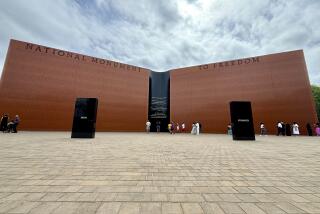Justices Order Commandments Display Moved
- Share via
MONTGOMERY, Ala. — Eight members of Alabama’s Supreme Court dealt a blow to Chief Justice Roy Moore and his supporters Thursday, unanimously ordering the removal of a Ten Commandments monument from the state Judicial Building.
Moore was defying a federal judge’s order to remove the 2 1/2-ton monument, which he placed in the rotunda two years ago. The justices Thursday instructed the building manager to “take all necessary steps to comply with the injunction as soon as practicable.”
It remained unclear when the granite monument would be taken away, or where it would end up -- perhaps in an area of the building that is out of public view, such as Moore’s chambers.
The state justices said Thursday they were “bound by the solemn oath to follow the law, whether they agree or disagree with it,” and that refusing to do so would impair the authority of all Alabama courts.
U.S. District Judge Myron H. Thompson ruled the monument an unconstitutional use of government facilities for the promotion of religion and instructed that it be taken out of the public area of the Judicial Building. He threatened to impose fines of $5,000 a day for not meeting the Wednesday midnight deadline for moving the monument.
On Wednesday, the U.S. Supreme Court refused Moore’s request to delay the removal order.
Moore said Thursday he was “very disappointed” that his fellow justices had acted. Moore struck a defiant note in comments before about 100 supporters on the front steps of the Judicial Building, whose doors were locked Thursday following the arrest the night before of nearly two dozen demonstrators on trespassing charges.
“I will not violate my oath, I cannot forsake my conscience, I will not neglect my duty, and I will never, never deny the God upon whom our ... laws and country depend,” Moore said.
He said he would again take the question to the U.S. Supreme Court.
But a public confrontation over the removal of the monument appeared increasingly unlikely, and Moore’s spokesman sounded resigned when asked what Moore would do. “He didn’t say he was going to throw himself bodily in front of it,” said the spokesman, Tom Parker.
Earlier in the day, a temporary barrier was erected in front of the monument. But Moore returned from a relative’s funeral when he found out and had it taken down.
Foes of the monument praised the decision by Moore’s fellow justices to step into the intensifying showdown between the state’s top jurist and a federal judge.
They said the elected justices had taken a politically risky stand on an issue that has turned Moore into a folk hero to many in Alabama.
“Anyone who sees what’s happening out there can see how popular Justice Moore is right now. This was a gut-check moment for them. Were they going to worry about popularity, or were they going to worry about the rule of law?” said Richard Cohen, general counsel of the Southern Poverty Law Center, one of the groups waging the court fight to remove the monument.
Ayesha Khan, legal director of Americans United for Separation of Church and State, which is also involved in the lawsuit, said that by overruling Moore, the mostly conservative justices had left him isolated.
“It shows what an extremist he is that every single one of the other Supreme Court justices have now taken a position against his,” she said.
But among the scores of Moore supporters, who for the last two days have planted themselves on the steps of the Judicial Building, there were noisy protests and angry vows to punish the jurists at the polls.
“They won’t ever get reelected in this state,” said Kelly McGinley, who hosts a Christian radio talk show in Mobile. “There’ll be a backlash, politically.”
Others said the removal of the Ten Commandments monument signaled a broader attack on the religious rights of Americans. “If you can’t put the Ten Commandments in a public building, what’s next?” said Wiley Dixon, a 46-year-old maintenance engineer from Warsaw, Ohio.
Dixon and five other members of an Ohio Christian group called Minutemen United drove 11 1/2 hours to show their support for Moore’s cause.
They joined scores of others who traveled from around Alabama and other states after hearing about the case from their pastors or through Christian broadcasts.
The gathering blended elements of a protest rally and prayer meeting. Some people fingered Bibles while others flipped through copies of the U.S. Constitution.
They held crosses and placards with the Ten Commandments spelled out. One woman made her point by pinning to her collar a dollar bill, folded to display the words “In God We Trust.”
Mindful of Alabama’s civil rights history, organizers sought to draw parallels between the Ten Commandments issue and the equality struggle, invoking the religion-laced appeals of Dr. Martin Luther King Jr. and reaching for the same songbook.
As the faithful waited on the steps for Moore to appear, they broke into “We Shall Overcome.”
Other legal battles remain. Plaintiffs in the case against Moore filed a new complaint Thursday before the state’s judicial inquiry commission, charging that Moore’s refusal to comply with the federal judge’s order amounted to a breach of judicial ethics. Lawyers also have asked Thompson to find the justice in contempt of court.
More to Read
Sign up for Essential California
The most important California stories and recommendations in your inbox every morning.
You may occasionally receive promotional content from the Los Angeles Times.













